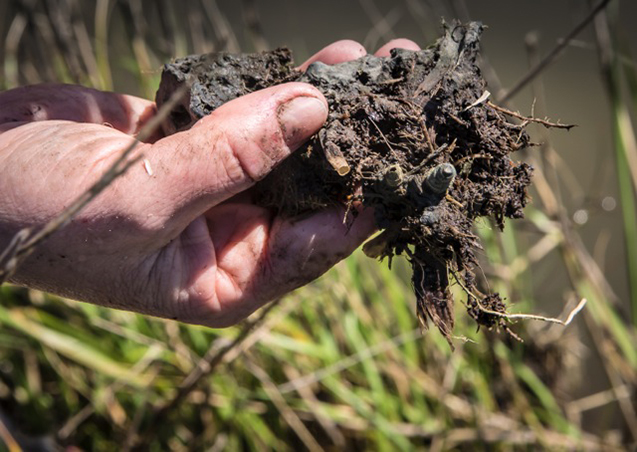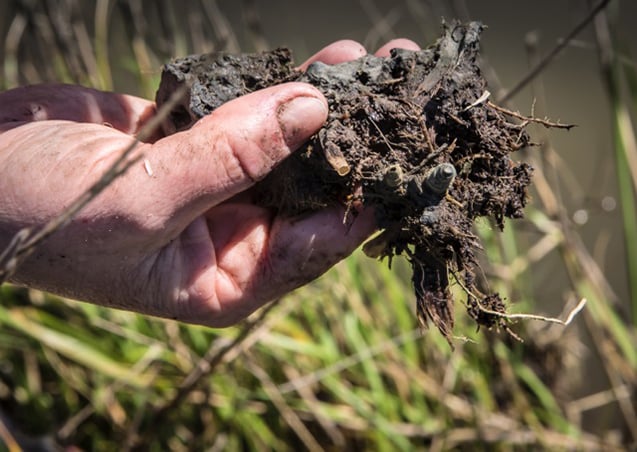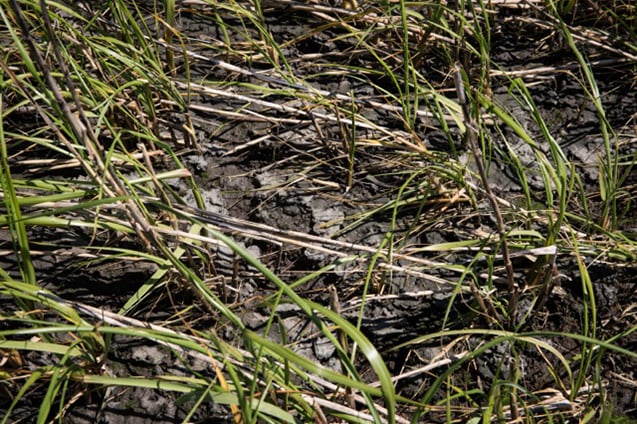
Louisiana State University entomologist Linda Hooper-Bui has been studying the impact of the BP oil spill on insects and spiders for almost four years. She started her study shortly after the Macondo well blew out on April 20, 2010, before any oil washed up on shore. Her work documents the dwindling of the insect population in areas directly hit with the oil.
On April 9th, she returned to Bay Jimmy and Bay Baptiste, areas that were heavily impacted by the oil spill in Plaquemines Parish, Louisiana.
“Insects are the basis of the food chain. They are like nature’s Twinkies,” Hooper-Bui says.
Her studies also monitor fish and birds, since they eat insects. She sweeps areas designated for her study by walking back and forth waving a net, catching whatever insects are present. She then empties the net into alcohol, preserving the insects for testing. She takes note of the wind speed and temperature at each location and collects a sample of sediment to be tested for hydrocarbons.
 Weathered oil found coating the surface of the marsh in Bay Baptiste, Louisiana on April 9, 2014. ©2014 Julie Dermansky
Weathered oil found coating the surface of the marsh in Bay Baptiste, Louisiana on April 9, 2014. ©2014 Julie Dermansky
Back in the lab, Hooper-Bui sorts insects by species. She sends some out for testing and stores the rest so other scientists can study them. The results of the test reveal the nutrients found in them, including carbon, nitrogen and sulfur. Knowing what the insects are eating helps her evaluate changes in the environment. She compares the data from sites that were oiled to those that were not.
 Linda Hooper-Bui holds a bag containing insects collected in Bay Jimmy, one of the areas hardest hit by the BP oil spill. ©2014 Julie Dermansky
Linda Hooper-Bui holds a bag containing insects collected in Bay Jimmy, one of the areas hardest hit by the BP oil spill. ©2014 Julie Dermansky
Hooper-Bui makes it clear that she is an independent scientist collaborating with other scientists at other institutions. Her work is not part of any government studies or studies subsidized by BP. Funding for her work has come from competitive grants from the National Science Foundation, the Northern Gulf Institute, the Gulf of Mexico Research Initiative and two grants from LSU. She believes being a scientist is a civic duty, and will not allow her work to be compromised.
Hooper-Bui’s first peer-reviewed reports should be available by this summer, but she has been sharing her observations with interested parties all along. She hopes her work will be utilized by those who have to deal with future spills and by those making policy decisions that involve the oil industry as well as locals who are still dealing directly with the aftermath of this disaster.
Since there are fewer insects and spiders for birds and fish to eat, she is seeing a decrease in other species’ success.
“This is what happens when the ecosystem seems to be disrupted,” Hooper-Bui says. Her studies show that not only does oil remain in the marsh in Plaquemines Parish, it is still emitting volatile aromatics. Preliminary results indicate the volatiles naphthalene and methylnaphthalene remain in the oil contaminated parts of the marsh, and could be responsible for the dramatic decline in insect population. Naphthalene is an insecticide, according to Hooper-Bui.
While standing on weathered oil on the shore of Bay Jimmy, Hooper-Bui told DeSmogBlog, “I am looking at how an environment rebuilds itself after a catastrophic disturbance. It is a chronic situation in the marsh, not an acute one because the oil is still here,” she notes. “The oil gets remobilized when storms hit, and when the tide is low and the temperature heats up, volatile compounds emit from the exposed weathered oil coating the surface.”
 Weathered oil coats the surface on the marsh in Bay Jimmy, one of the areas hardest hit by the BP oil spill. ©2014 Julie Dermansky
Weathered oil coats the surface on the marsh in Bay Jimmy, one of the areas hardest hit by the BP oil spill. ©2014 Julie Dermansky
Hurricanes affect insects too, so weather factors into Hooper-Bui’s data as well. She has been involved with research about storm effects on insect populations since 2009. Her earlier work gave her benchmark data on how insect populations are affected by storms.
“A healthy environment will rebuild itself after a storm,” Hooper-Bui says. “We know that from Isaac – a compromised eco-system is of concern. The plants might look o.k. but the insects are constantly fumigated when the water is not on the marsh (due to north wind or low tides) and the temperatures are high – when sediment is exposed – the volatile compounds come off the marsh and fumigate the insects and they die – we have results for three years to show that, in the field and in the lab.”
Critics of her studies claim there are no volatiles coming off the marsh. But Hooper-Bui stands by her findings.
“We put cages with insects in them where the only interactions the caged insects had with the environment were with the air in the marsh – and they were dying in oiled areas and surviving in non-oiled areas. When the marsh’s sediment is exposed and the temperature gets above 85 degrees Fahrenheit, the oil is being biologically degraded, the oil is releasing volatiles and is killing the insects.”
A report released by The National Wildlife Federation before the fourth anniversary of the BP disaster deals with 14 species higher up in the food chain than insects. On dolphins, the report cites the National Oceanic and Atmospheric Administration (NOAA) report that states, “NOAA researchers found strong evidence that the ill health of the dolphins in Louisiana’s Barataria Bay was related to oil exposure.”
And on tuna, “20% of larval fish could have been exposed to oil, with a potential reduction in future populations of about 4%. For a species already in peril, reductions in reproductive success and lower populations can be major impediments to recovery.”
The report goes on to cite a study co-authored by John Incardona, research toxicologist at NOAA. From the NWF report:
“A more recent study shows that a chemical in oil from the spill can cause irregular heartbeats in bluefin and yellowfin tuna that can lead to heart attacks, or even death. The effects are believed to be particularly problematic for fish embryos and larvae, as heartbeat changes could affect development of other organs. The researchers suggest that other vertebrate species in the Gulf of Mexico could have been similarly affected.”
BP refutes the report. BP spokesman Jason Ryan told UPI, “The National Wildlife Federation report is a piece of political advocacy, not science,” he said. “It cherry picks reports to support the organization’s agenda, often ignoring caveats in those reports or mischaracterizing their findings.”
However, BP has been criticized for claiming the company will make things right in their advertisements. BP’s ads stress they are committed to the Gulf and committed to America and that business is back to normal, yet BP continually objects to a claims settlement the company already signed off on. They have also been accused of acting as trolls on internet sites and spreading misinformation.
 Linda Hooper-Bui checking sediment in Bay Jimmy, some of it mixed with weathered oil. ©2014 Julie Dermansky
Linda Hooper-Bui checking sediment in Bay Jimmy, some of it mixed with weathered oil. ©2014 Julie Dermansky
Hooper-Bui explains, “Insects are important to study because they are the basis of the food chain – and because people don’t care about them, I can manipulate them for my studies without upsetting anyone. Insects are like a canary in a coal mine,” she says. “There is a big problem when they start dying.”
To anyone who thinks the oil isn’t still out there, Hooper-Bui says, “Come out here and I’ll show you. It wasn’t cleaned up.”
Help us Prepare for Trump’s Day One
Trump is busy getting ready for Day One of his presidency – but so is Truthout.
Trump has made it no secret that he is planning a demolition-style attack on both specific communities and democracy as a whole, beginning on his first day in office. With over 25 executive orders and directives queued up for January 20, he’s promised to “launch the largest deportation program in American history,” roll back anti-discrimination protections for transgender students, and implement a “drill, drill, drill” approach to ramp up oil and gas extraction.
Organizations like Truthout are also being threatened by legislation like HR 9495, the “nonprofit killer bill” that would allow the Treasury Secretary to declare any nonprofit a “terrorist-supporting organization” and strip its tax-exempt status without due process. Progressive media like Truthout that has courageously focused on reporting on Israel’s genocide in Gaza are in the bill’s crosshairs.
As journalists, we have a responsibility to look at hard realities and communicate them to you. We hope that you, like us, can use this information to prepare for what’s to come.
And if you feel uncertain about what to do in the face of a second Trump administration, we invite you to be an indispensable part of Truthout’s preparations.
In addition to covering the widespread onslaught of draconian policy, we’re shoring up our resources for what might come next for progressive media: bad-faith lawsuits from far-right ghouls, legislation that seeks to strip us of our ability to receive tax-deductible donations, and further throttling of our reach on social media platforms owned by Trump’s sycophants.
We’re preparing right now for Trump’s Day One: building a brave coalition of movement media; reaching out to the activists, academics, and thinkers we trust to shine a light on the inner workings of authoritarianism; and planning to use journalism as a tool to equip movements to protect the people, lands, and principles most vulnerable to Trump’s destruction.
We’re asking all of our readers to start a monthly donation or make a one-time donation – as a commitment to stand with us on day one of Trump’s presidency, and every day after that, as we produce journalism that combats authoritarianism, censorship, injustice, and misinformation. You’re an essential part of our future – please join the movement by making a tax-deductible donation today.
If you have the means to make a substantial gift, please dig deep during this critical time!
With gratitude and resolve,
Maya, Negin, Saima, and Ziggy